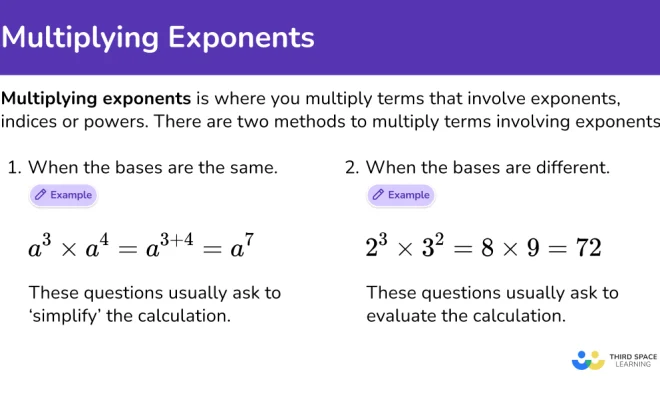Ways to Multiply Exponents: A Comprehensive Guide

Introduction
Exponents are frequently used in mathematics to simplify complex calculations, particularly in algebra and higher-level math courses. When working with exponents, you may come across situations where you need to multiply numbers or variables raised to different powers. In this article, we will cover three different methods for multiplying exponents: multiplying with the same base, multiplying with different bases and same exponents, and using distributive properties.
1. Multiplying with the Same Base
When two or more numbers share the same base and have different exponents, you can simply add the exponents together to multiply the values. This technique follows a fundamental rule of exponents: a^m * a^n = a^(m+n).
For example, let’s multiply 3^2 * 3^4:
3^2 * 3^4 = 3^(2+4) = 3^6 = 729
To multiply variables with exponents, follow the same rule:
x^2 * x^3 = x^(2+3) = x^5
2. Multiplying with Different Bases and Same Exponents
When two or more numbers have different bases but share the same exponent, you can use the following rule: (a*b)^m = a^m * b^m.
For example, let’s multiply 2^3 * 4^3:
(2*4)^3 = (8)^3 = 512
This can also be used when multiplying variables with different bases and same exponents:
(2x)^3 can be expanded into (2^3)*(x^3) which is 8x^3.
Remember that this rule applies only when the exponents are the same. It doesn’t work when the exponents are different.
3. Using Distributive Properties
The distributive property can also be used to multiply exponents in some situations. The distributive property states that a(b + c) = ab + ac.
For example, when multiplying (2 + x)^3, you would first apply the distributive property:
(2 + x)^3 = (2+x)(2+x)(2+x)
Now you can use the FOIL method (First, Outer, Inner, Last) to multiply the terms and obtain the final result:
(2+x)(4+4x+x^2) = 8+16x+4x^2+4x^3
Therefore, (2 + x)^3 is 8+16x+4x^2+4x^3.
Conclusion
Multiplying exponents is an essential skill in algebra and higher mathematics.

